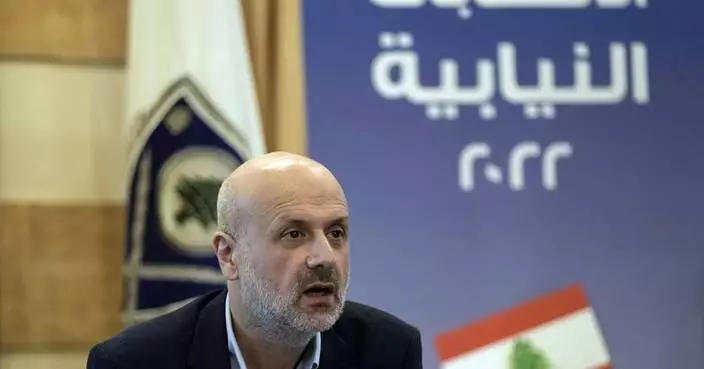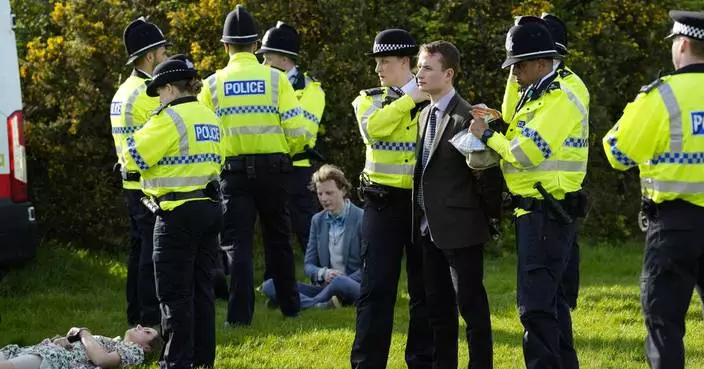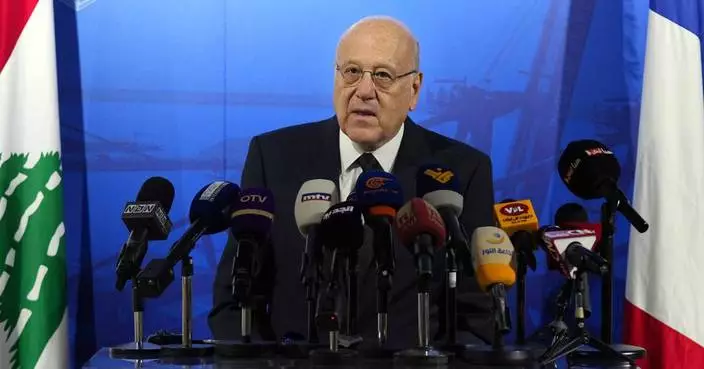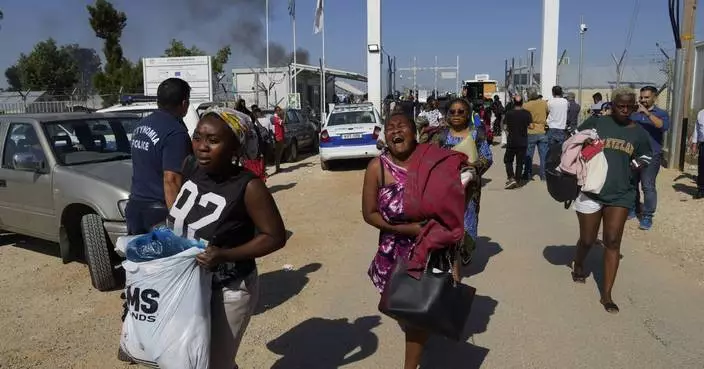Lebanon’s information minister resigned on Sunday as the country grapples with the aftermath of the devastating blast that ripped through the capital and raised public anger to new levels.
The resignation comes as public anger is mounting against the ruling elite, blamed for the chronic mismanagement and corruption that is believed to be behind the explosion in a Beirut Port warehouse. Hundreds of tons of highly explosive material was stored in the waterfront hangar, and a blast sent a shock wave that killed at least 160 people, wounded nearly 6,000 and defaced the coastline of Beirut — destroying hundreds of buildings.
Click to Gallery
Lebanon’s information minister resigned on Sunday as the country grapples with the aftermath of the devastating blast that ripped through the capital and raised public anger to new levels.
“Given the magnitude of the catastrophe caused by the Beirut earthquake that shook the nation and hurt our hearts and minds, and in respect for the martyrs, and the pains of the wounded, missing and displaced, and in response to the public will for change, I resign from the government," she wrote.
Protesters also fanned out around the city, storming a couple of government ministries. They briefly took over the foreign ministry, saying it will be the headquarters of their movement. In the economy and energy ministries, the protesters ransacked offices and seized public documents claiming they would reveal how corruption has permeated successive governments.
Diab took over in January and has since been beset by crises.
In a televised speech Saturday evening, Diab said the only solution was to hold early elections. He called on all political parties to put aside their disagreements and said he was prepared to stay in the post for two months to allow time for politicians to work on structural reforms.
Demonstrators clash with police during a protest against the political elites and the government after this week's deadly explosion at Beirut port which devastated large parts of the capital in Beirut, Lebanon, Saturday, Aug. 8, 2020. (AP PhotoFelipe Dana)
Protestors clash with police during a protest against the political elites and the government after this week's deadly explosion at Beirut port which devastated large parts of the capital in Beirut, Lebanon, Saturday, Aug. 8, 2020. (AP PhotoThibault Camus)
Manal Abdel-Samad said in her resignation letter that change remained “elusive” and she regrets failing to fulfill the aspirations of the Lebanese people.
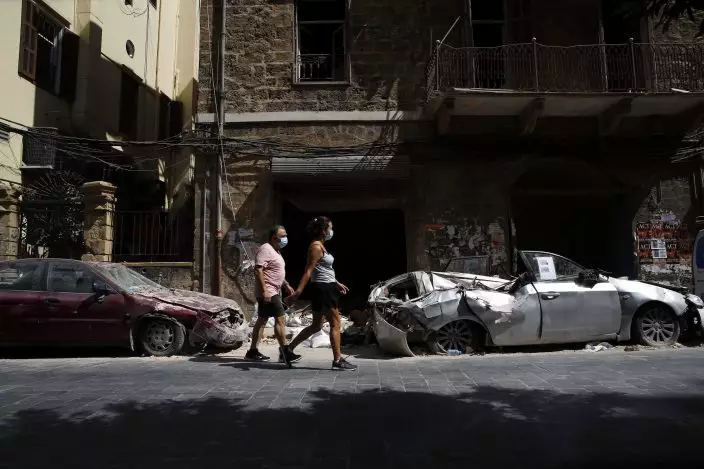
People walk past destroyed cars at a neighborhood near the scene of Tuesday's explosion that hit the seaport of Beirut, Lebanon, Sunday, Aug. 9, 2020. Public fury over the massive explosion in Beirut took a new turn Saturday night as protesters stormed government institutions and clashed for hours with security forces, who responded with heavy volleys of tear gas and rubber bullets. (AP PhotoThibault Camus)
“Given the magnitude of the catastrophe caused by the Beirut earthquake that shook the nation and hurt our hearts and minds, and in respect for the martyrs, and the pains of the wounded, missing and displaced, and in response to the public will for change, I resign from the government," she wrote.
The disaster fueled angry demonstrations Saturday where protesters set up gallows and nooses in central Beirut and held mock hanging sessions of cut-out cardboard images of top Lebanese officials.
Demonstrators held signs that read “resign or hang.” The protests quickly turned violent when the demonstrators pelted stones at the security forces, who responded with heavy volleys of tear gas and rubber bullets. One police officer was killed and dozens of people were hurt in confrontations that lasted for hours.
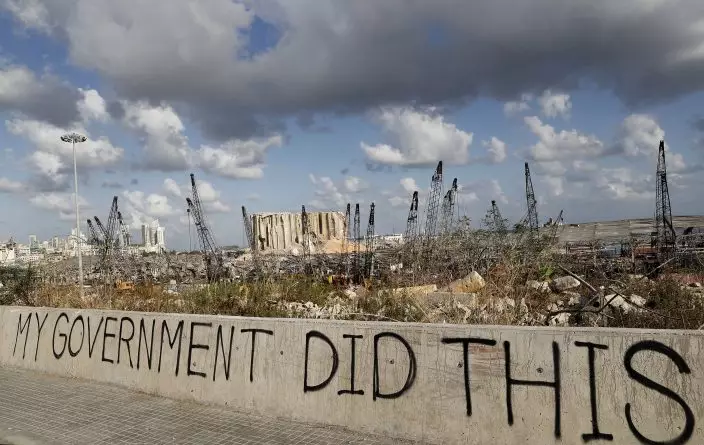
Words are written by Lebanese citizens in front of the scene of Tuesday's explosion that hit the seaport of Beirut, Lebanon, Sunday, Aug. 9, 2020. Public fury over the massive explosion in Beirut took a new turn Saturday night as protesters stormed government institutions and clashed for hours with security forces, who responded with heavy volleys of tear gas and rubber bullets. (AP PhotoHussein Malla)
Protesters also fanned out around the city, storming a couple of government ministries. They briefly took over the foreign ministry, saying it will be the headquarters of their movement. In the economy and energy ministries, the protesters ransacked offices and seized public documents claiming they would reveal how corruption has permeated successive governments.
Five of the parliament's 128 members have also announced their resignation since Saturday— including three legislators of the Christian Kataeb party, a member of the Socialist Progressive Party and an independent.
Abdel-Samad's resignation comes amid reports that another government official — the environment minister — is expected to resign, adding to the challenges facing Prime Minister Hassan Diab.
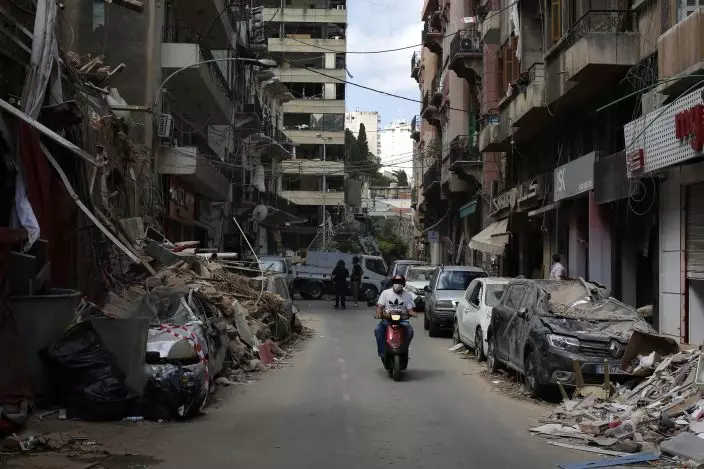
A man rides past damaged buildings at a neighborhood near the scene of Tuesday's explosion that hit the seaport of Beirut, Lebanon, Sunday, Aug. 9, 2020. Public fury over the massive explosion in Beirut took a new turn Saturday night as protesters stormed government institutions and clashed for hours with security forces, who responded with heavy volleys of tear gas and rubber bullets. (AP PhotoThibault Camus)
Diab took over in January and has since been beset by crises.
The government, backed by the powerful militant Hezbollah group and its allies, announced it is defaulting on Lebanon's sovereign debt and has since been engaged in difficult, internally divisive talks with the International Monetary Fund for assistance. The coronavirus restrictions deepened the impact of the economic and financial crisis and fueled public anger against the new government. Lebanese have criticized Diab's government for being unable to tackle the challenges, saying it represents the deep-seated political class that has had a hold of the country's politics since the end of the civil war in 1990.
Foreign Minister Nassif Hitti resigned even before the blast, citing an absence of "effective will to achieve comprehensive structural reform” and competing leadership.
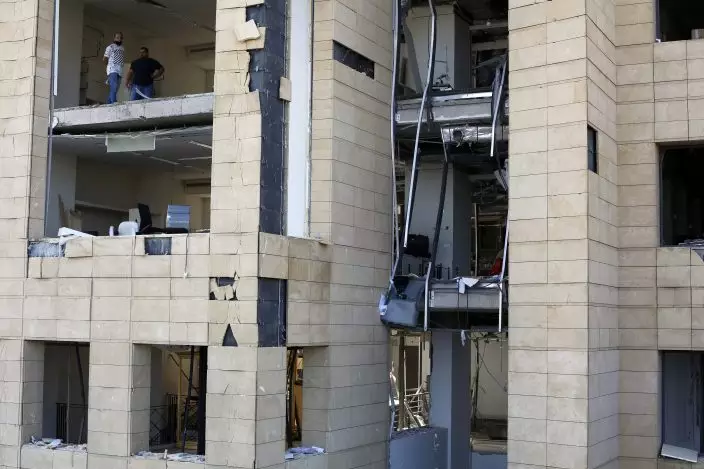
People stand in a damaged building near the scene of Tuesday's explosion that hit the seaport of Beirut, Lebanon, Sunday, Aug. 9, 2020. Public fury over the massive explosion in Beirut took a new turn Saturday night as protesters stormed government institutions and clashed for hours with security forces, who responded with heavy volleys of tear gas and rubber bullets. (AP PhotoThibault Camus)
In a televised speech Saturday evening, Diab said the only solution was to hold early elections. He called on all political parties to put aside their disagreements and said he was prepared to stay in the post for two months to allow time for politicians to work on structural reforms.
The offer is unlikely to soothe the escalating fury on the street. It is also expected to trigger lengthy discussions over the election law amid calls for introducing changes to the country's sectarian-based representation system.
The information minister's resignation comes ahead of an international conference co-hosted by French President Emmanuel Macron and United Nations Secretary-General Antonio Guterres aimed at bringing donors together to supply emergency aid and equipment to Lebanon. Previous offers of aid have been contingent on carrying out significant government reforms to tackle corruption.
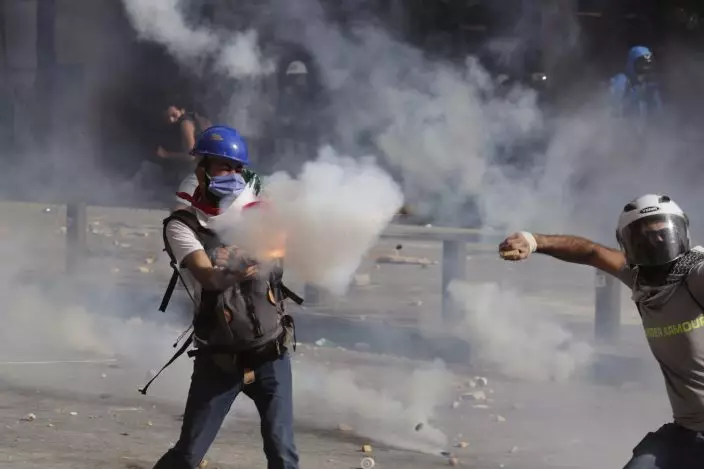
Anti-government protesters clash with riot police officers during a protest against the political elites and the government after this week's deadly explosion at Beirut port which devastated large parts of the capital in Beirut, Lebanon, Saturday, Aug. 8, 2020. (AP PhotoHassan Ammar)
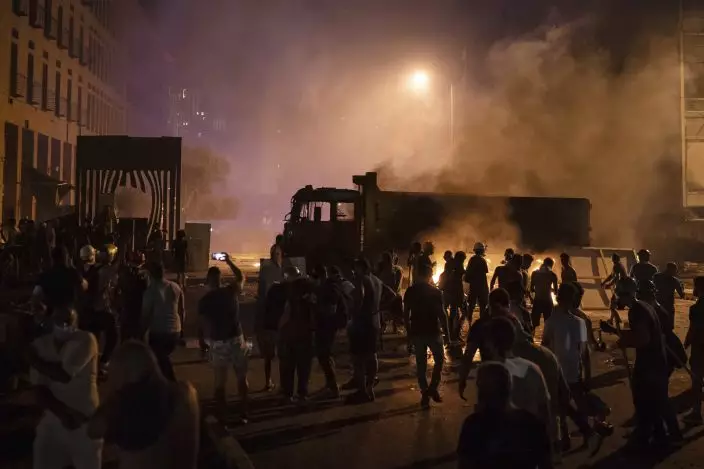
Demonstrators clash with police during a protest against the political elites and the government after this week's deadly explosion at Beirut port which devastated large parts of the capital in Beirut, Lebanon, Saturday, Aug. 8, 2020. (AP PhotoFelipe Dana)
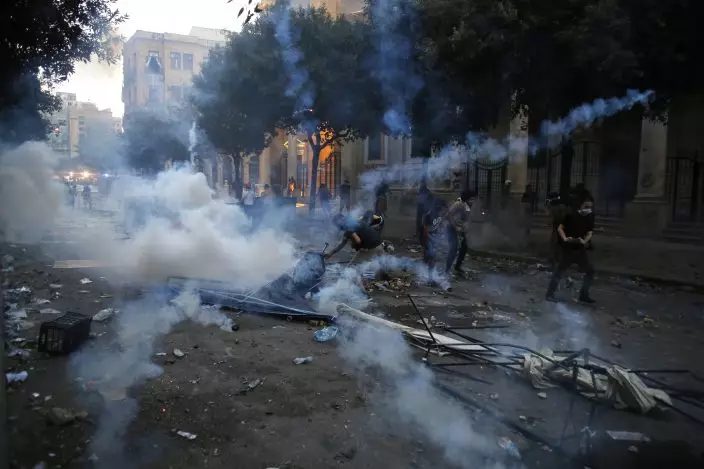
Protestors clash with police during a protest against the political elites and the government after this week's deadly explosion at Beirut port which devastated large parts of the capital in Beirut, Lebanon, Saturday, Aug. 8, 2020. (AP PhotoThibault Camus)
BEIT MERI, Lebanon (AP) — Lebanon’s interior minister alleged Wednesday that the mysterious abduction and killing of a Hezbollah-linked Lebanese currency exchanger in a villa on the edge of a quiet mountain resort town earlier this month was likely the work of Israeli intelligence operatives.
The killing of Mohammad Srour, 57, who was sanctioned by the U.S., was like something out of an international spy thriller. Pistols equipped with silencers and gloves were found in a bucket of water at the scene, along with chemicals apparently intended to remove fingerprints and other evidence, Interior Minister Bassam Mawlawi said in an interview with The Associated Press. Thousand of dollars in cash were left scattered around Srour’s body, as if to dispel any speculation that robbery was the motive.
“Lebanese security agencies have suspicion or accusations that Mossad was behind this operation,” Mawlawi said, referring to the Israeli spy agency. “The way the crime was carried out led to this suspicion.”
He provided no specific evidence for his allegations. Mawlawi said the investigation is still ongoing and once it's over, the results will be made public and referred to judicial authorities.
The Israeli prime minister’s office, which oversees Mossad, did not immediately respond to a request for comment.
The suspicion by Lebanon’s security agencies that the crime could be the work of Israeli agents comes at a time when Lebanon’s southern border region has been rocked by ongoing clashes between militants of the Hamas-allied Hezbollah group and Israeli troops.
The U.S. Treasury sanctioned Srour in 2019 over his alleged money transfers from Iran through Hezbollah to the Palestinian militant group Hamas in the Gaza Strip.
“Mohammad Srour’s activity in money exchange is known, as are the transfers of money from which side to which side,” Mawlawi said.
Srour’s killing earlier this month, came as U.S. and Israeli officials have been trying to crack down on transfers of funds to Hamas. The push has intensified following the Oct. 7 Hamas-led attack on southern Israel that triggered the devastating war in Gaza and its ripple effects around the region.
Last month, a senior U.S. Treasury official visiting Beirut pressed Lebanese authorities to prevent funds from being funneled to Hamas through the tiny country. Jesse Baker, deputy assistant secretary of the Treasury for Asia and the Middle East in the Office of Terrorist Financing and Financial Crimes, met with top Lebanese political and financial officials.
Israel's military said it has killed a number of money exchangers in Gaza for allegedly funding Hamas.
Srour’s killing was clearly planned in advance. Three Lebanese judicial officials familiar with the investigation told the AP that a man posing as a customer had contacted Srour from abroad and asked him to deliver a cash transfer to a woman in the mountain resort of Beit Meri.
The officials, who spoke on condition of anonymity because the investigation is ongoing, said Srour first went with his nephew and left after handing the woman the money. He was contacted by the same person with another request a day after his first visit, the officials said. This time he went alone, after which his family lost contact with him.
Mawlawi said the cellphone the woman used to get in touch with Srour was only activated to contact him.
He said the perpetrators had first tried to rent an apartment in Beirut’s southeastern suburb of Hazmieh, a detail that has not been previously reported, but they later canceled, apparently because “they did not find (the apartment) suitable to carry out the operation."
Mawlawi said the killers then shifted to the quiet town of Beit Meri, famous for its posh homes with red-brick roofs, sprawling forest and Roman-era archaeological site, where they rented a three-story villa on the edge of the town using fake Lebanese identity cards. The General Security Directorate is looking into the identities of people who entered and left the country around the period of the killing, he said.
Srour went missing on April 3 in Beit Meri, and his body was found a week later in the villa. Mawlawi said investigators found “a large number of bullet” wounds in different parts of his body, including his arms and legs. He was reportedly handcuffed.
The villa is located on a quiet side street lush with trees.
“We did not hear anything,” said Christian Francis, who lives across the street from the villa where Srour was killed. He added that most people in the highly secured area have dogs, while municipal police have a checkpoint nearby and the Lebanese army has a post few hundred meters (yards) away.
Beit Meri’s mayor, Roy Abou Chedid, told the AP that the apartment was rented in late February to an unknown person for one year for $48,000. He added that the family that owns the villa did not register the rental contract at the municipality but had paid its municipal taxes on time in November.
“The operation was carried out in a way that is more than professional,” Abou Chedid said, adding that the neighbors did not suspect anything and it took security agencies some time to locate which house Srour’s body was in.
A Hezbollah spokesperson declined to comment on the killing citing the ongoing investigation. The spokesperson refused to say whether Srour was a Hezbollah member but said that he worked in the past for the al-Qard al-Hasan Association, the financial arm of the Iran-backed group.
Israel has a long history of targeted killings in Lebanon, including drone strikes that have killed high-ranking Hezbollah commanders over the past six months. At least 260 Hezbollah members have been killed by Israel in that period.
The U.S. has accused Srour of transferring tens of millions of dollars annually from Iran’s Islamic Revolutionary Guard Corps to Hamas’ military wing, the Qassam Brigades, alleging that starting in 2014, Srour “was identified as in charge of all money transfers” from the IRGC to the Qassam Brigades.
Srour’s family members have not given media interviews since his body was found but said in a televised statement that all his financial transactions were transparent and he simply worked in currency exchange. They urged security agencies to swiftly find the perpetrators.
During Srour’s funeral in his hometown of Labweh in northeast Lebanon, a Hezbollah flag was flown over his coffin and scores of men and women chanted “death to America and death to Israel” as they marched toward the cemetery.
Chehayeb reported from Beirut. Associated Press writer Josef Federman contributed to this report from Jerusalem.
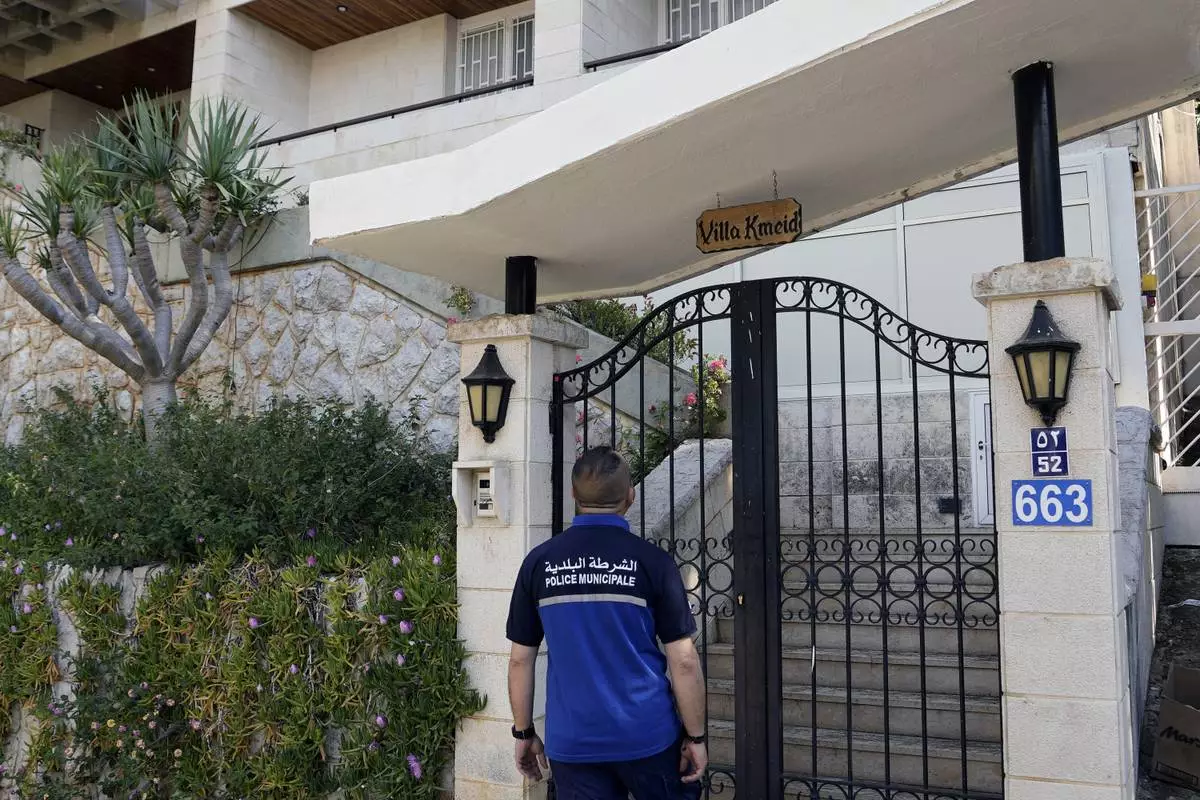
A municipal police officer stands outside a villa where the Lebanese money changer Mohammad Srour, 57, was found tortured and killed in Monte Verdi neighborhood of Beit Meri, Lebanon, Tuesday, April 16, 2024. Lebanon’s interior minister alleged Wednesday that the mysterious abduction and killing of a Hezbollah-linked Lebanese financier in a villa on the edge of a quiet mountain resort town earlier this month was likely the work of Israeli operatives. (AP Photo/Hassan Ammar)
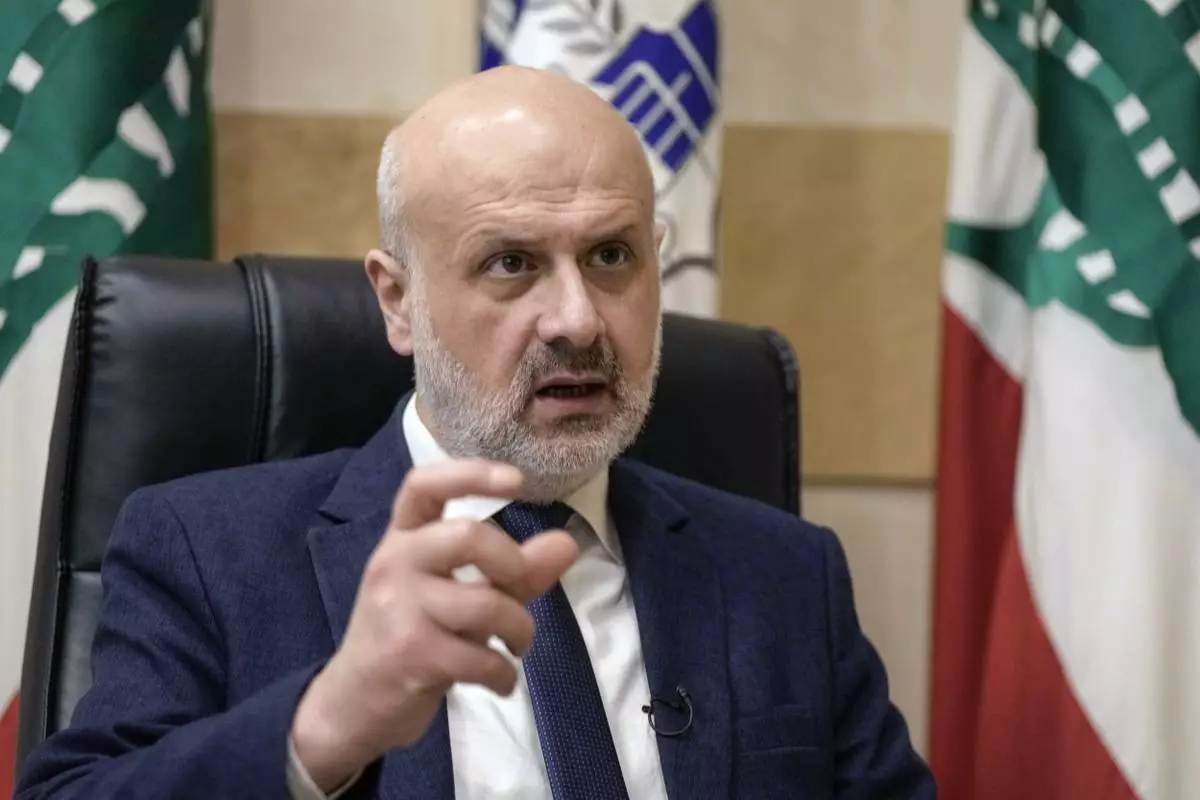
Lebanese Interior Minister Bassam Mawlawi, speaks during an interview with the Associated Press at the interior ministry in Beirut, Lebanon, Tuesday, April 16, 2024. Lebanon’s interior minister alleged Wednesday that the mysterious abduction and killing of a Hezbollah-linked Lebanese financier in a villa on the edge of a quiet mountain resort town earlier this month was likely the work of Israeli operatives. (AP Photo/ Hassan Ammar)
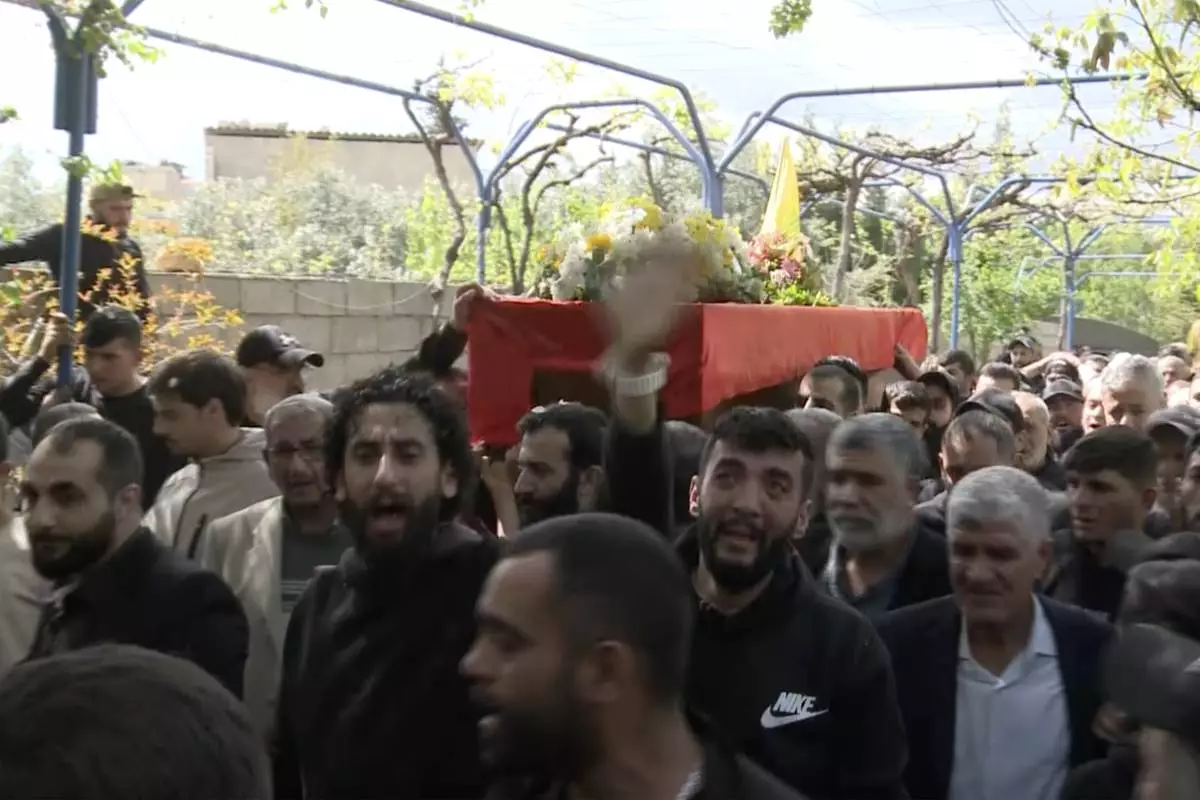
In this grab taken from video, mourners carry the coffin of Lebanese money changer Mohammad Srour, 57, who was found tortured and killed inside a villa in Monte Verdi neighborhood of Beit Meri, during his funeral procession in Labweh village, near the border with Syria, northeast Lebanon, Thursday, April 11, 2024. Lebanon’s interior minister alleged Wednesday that the mysterious abduction and killing of a Hezbollah-linked Lebanese financier in a villa on the edge of a quiet mountain resort town earlier this month was likely the work of Israeli operatives. (AP Photo)
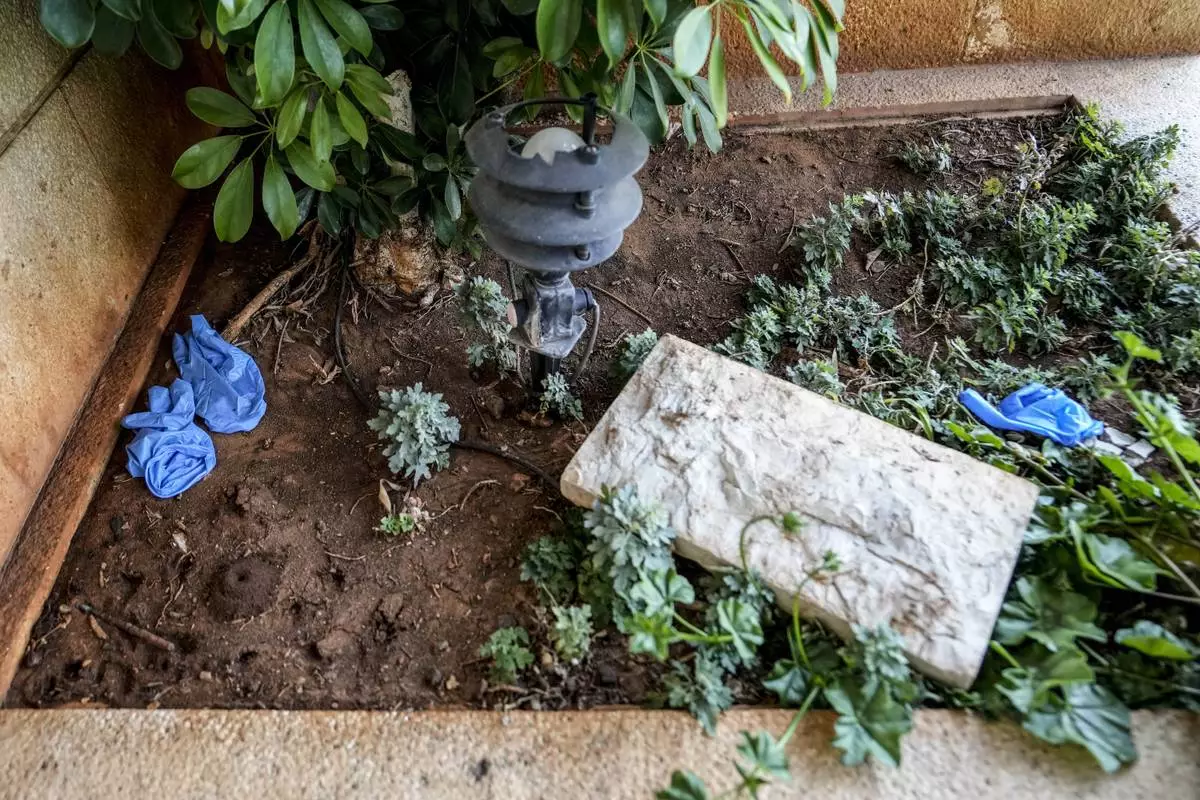
Medical gloves sit outside a villa where money changer Mohammad Srour, 57, was found tortured and killed in Monte Verdi neighbourhood of Beit Meri, Lebanon, Tuesday, April 16, 2024. Lebanon’s interior minister alleged Wednesday that the mysterious abduction and killing of a Hezbollah-linked Lebanese financier in a villa on the edge of a quiet mountain resort town earlier this month was likely the work of Israeli operatives. (AP Photo/Hassan Ammar)
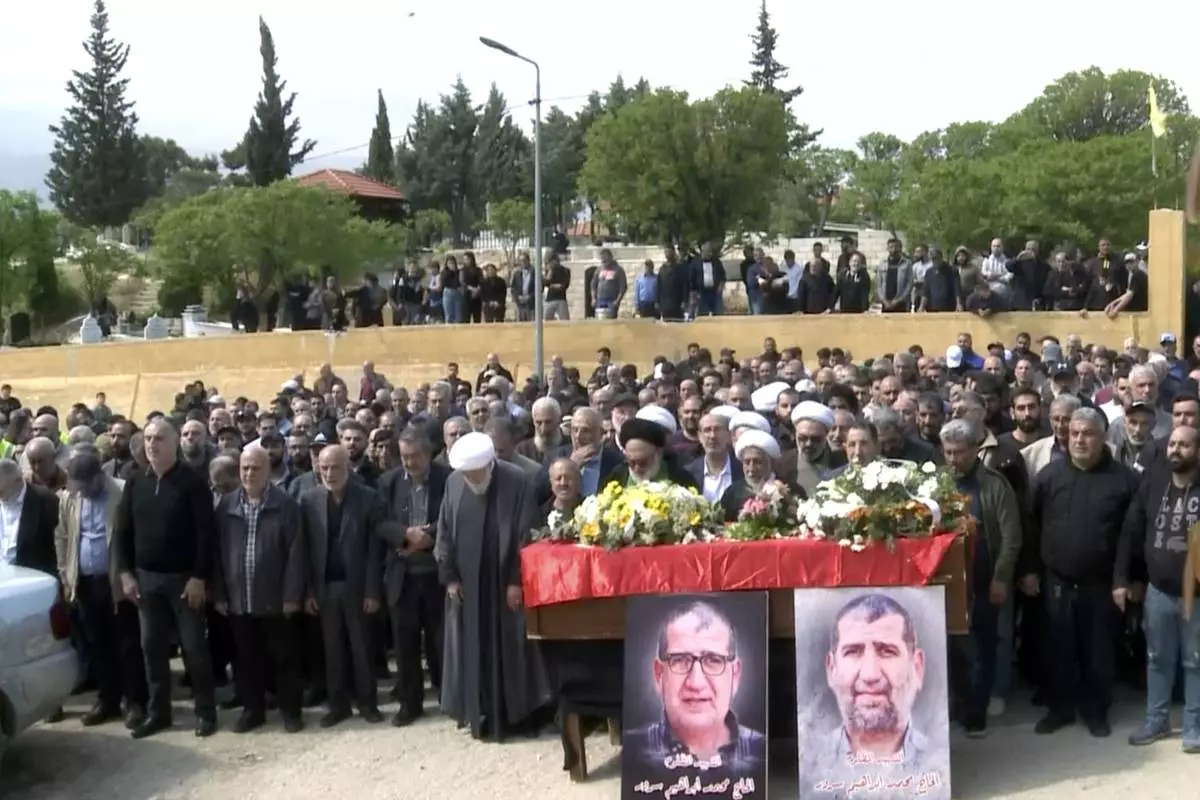
In this grab taken from video, mourners pray over the coffin of Lebanese money changer Mohammad Srour, 57, who was found tortured and killed inside a villa in Monte Verdi neighborhood of Beit Meri, during his funeral procession in Labweh village, near the border with Syria, northeast Lebanon, Thursday, April 11, 2024. Lebanon’s interior minister alleged Wednesday that the mysterious abduction and killing of a Hezbollah-linked Lebanese financier in a villa on the edge of a quiet mountain resort town earlier this month was likely the work of Israeli operatives. (AP Photo)
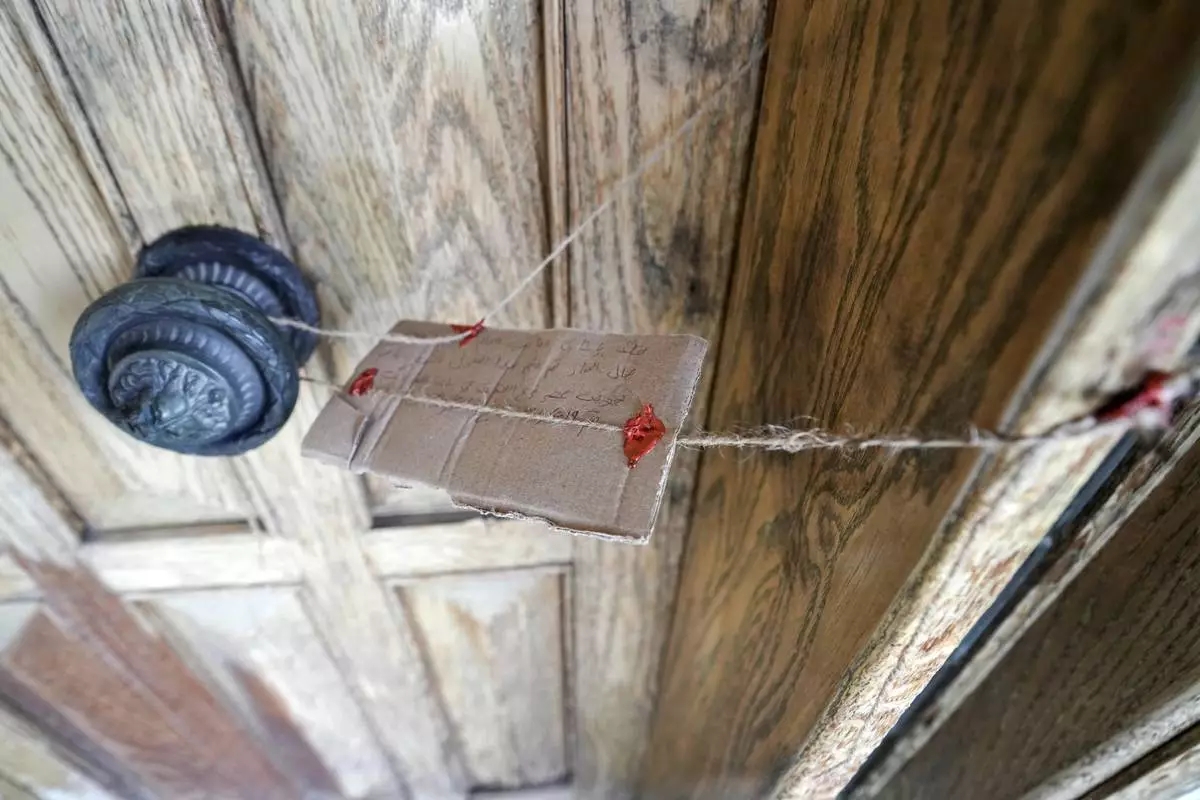
Lebanese authorities sealed the main door of a villa where money changer Mohammad Srour, 57, was found tortured and killed in Monte Verdi neighbourhood of Beit Meri, Lebanon, Tuesday, April 16, 2024. The mysterious abduction and murder of a United States-sanctioned Lebanese money changer in a three-story villa on the edge of a quiet mountain resort town overlooking Beirut was most likely the work of Israeli operatives, Lebanon's interior minister said Wednesday. (AP Photo/Hassan Ammar)

Municipal police officers patrol outside a villa where the Lebanese money changer Mohammad Srour, 57, was found tortured and killed in Monte Verdi neighbourhood of Beit Meri, Lebanon, Tuesday, April 16, 2024. Lebanon’s interior minister alleged Wednesday that the mysterious abduction and killing of a Hezbollah-linked Lebanese financier in a villa on the edge of a quiet mountain resort town earlier this month was likely the work of Israeli operatives. (AP Photo/Hassan Ammar)


















